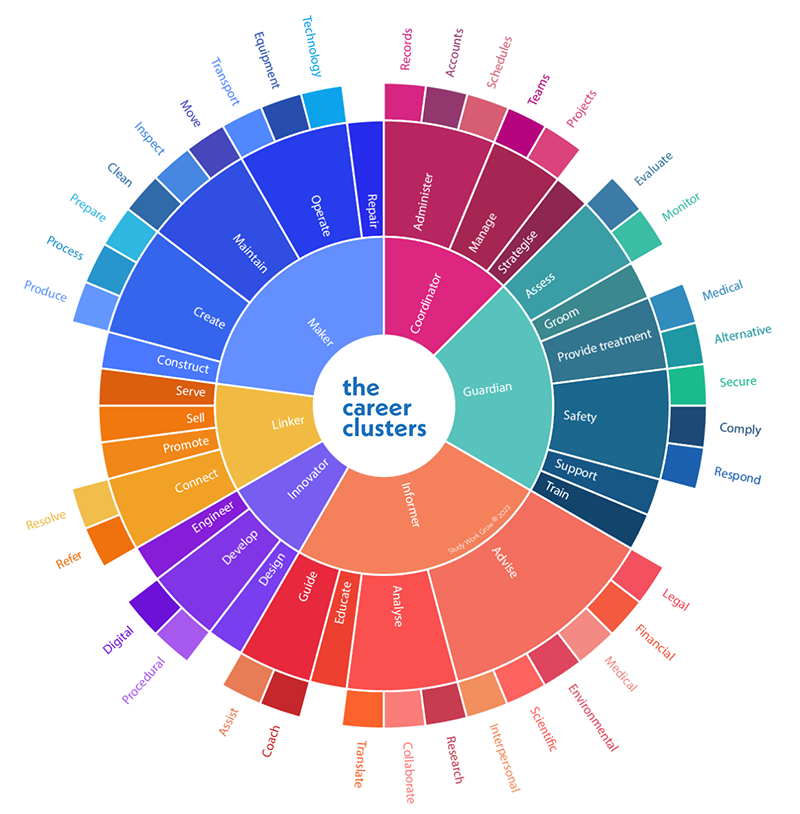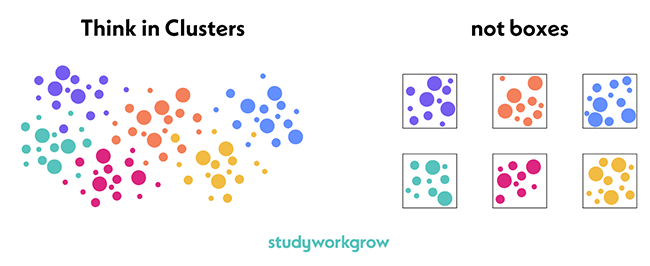Rethinking Work With the Career Clusters
05/06/2023
Lucy Sattler is the CEO at Study Work Grow and is passionate about providing careers advisors with a quality source of information. Study Work Grow launched the Career Clusters in early February this year, with 156 Australian high schools and 5 universities applying to use the free resources in just the first two weeks.

We’ve been thinking about jobs and work the same way for a really long time, and we think that it’s time to take another look at the language we use. The old method of slotting people into static, linear jobs won’t work for the flexible, dynamic world of work we’re rapidly moving into.
The research shows that young people struggle to think beyond the ‘popular’ jobs – those old favourites we coloured-in in preschool, like doctor, chef, racecar driver, that aren’t exactly representative of the workforce as it is today. In fact, around half of all teenagers expect to work in just one of ten common jobs when they grow up, and getting them to think beyond these jobs is a battle. Most of the jobs we’ll end up in are ‘invisible’ – we had no idea they existed while we were at school, and that’s problematic because if we don’t know they exist then how can we expect young people to want to work in them?
This is why we believe moving to a Career Cluster model makes sense.
The Career Clusters group people in dynamic, flexible Clusters based on the types of tasks they enjoy, their technical and transferable skillset, the work environments they prefer, and the types of things they value about the work they do. People can move and grow within the Clusters, and they can change workplace and industry while still remaining in their key Clusters.
There are six Clusters:
The Coordinators
These organised people keep everything running as it should – you’ll find them in every workplace and at every level of the organisation, from the front desk through to senior management.
The Guardians
These people focus on health and wellbeing, and while they thrive in healthcare and aged care roles they also help us maintain our fitness, feel good about our appearance, and keep us safe.
The Informers
Informers generally know quite a lot about something, and then they use this knowledge to help other people either by guiding, teaching, advising, or assisting. This means people who work in law, finance, and education are often Informers, but this Cluster includes anyone with an expert level of knowledge, including Dive Instructors and Horse Whisperers.
The Innovators
These innovative people are designers, artists, and engineers, and they use their creativity to create solutions for problems. Often, Innovators work closely with other Clusters such as Makers and Coordinators to implement their solutions.
The Linkers
Linkers are natural connectors, and they enjoy linking people with the services, support, and products they need. They generally need strong area-specific knowledge, as well as the ability to solve problems and strong communications skills.
The Makers
These people make things happen; they operate equipment and technology, pilot vehicles, inspect and maintain, and produce and construct. These people tend to enjoy physical work and using tools and equipment in their roles.

We’ve mapped the Career Clusters to the Australian Skills Classification, which enabled us to break the Clusters down further into common core tasks and sub-tasks. The Cluster Wheel helps us think in depth about the types of work we can do in each Cluster, and how we can move and shift across the Clusters during our career.
It’s for that reason that we chose to think in Clusters, not boxes. Typically, psychometric assessments return just one clear answer, which doesn’t reflect the way we work today. Most of us tend to work across more than one Cluster, although we may have one that speaks to us more than the rest, and using a Cluster framework allows us to explore pathways across and around the Clusters.

We’re still developing the resources that support the Career Clusters for schools, and we’ve already had over 7000 people take the Quiz so far. The Clusters are designed to facilitate career conversations, and we’re working on resources that schools and Career Development Practitioners will be able to use to start more powerful conversations with young people.
As a Social Enterprise, it’s important to us that all schools can access quality resources, which is why we’ve made the Career Clusters free for all educational uses, and schools, charities, and other educational institutions are welcome to apply to use the Career Clusters here.